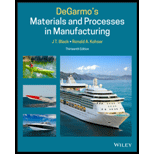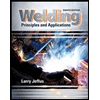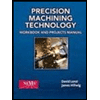
Degarmo's Materials And Processes In Manufacturing
13th Edition
ISBN: 9781119492825
Author: Black, J. Temple, Kohser, Ronald A., Author.
Publisher: Wiley,
expand_more
expand_more
format_list_bulleted
Concept explainers
Question
Chapter 19, Problem 14RQ
To determine
The importance of proper alignment of blanking punch and die.
Expert Solution & Answer
Want to see the full answer?
Check out a sample textbook solution
Students have asked these similar questions
Q1/ Show that (actual
02/ A simple iet
==
Cda
Cdf
х
Af
2/Y
-
Y+1/Y
2P(P1-P2-zxgxpr)
5. Determine the transfer function of G(s) = 01(s)/T₁(s) and 02(s)/T₁ for the mechanical system
shown in Figure Q5. (Hints: assume zero initial condition)
T₁(t) 01(t)
102(1)
Ол
N1
D1
D2
No. 1790220000
N2
Figure Q5
K2
A spring package with two springs and an external force, 200N. The short spring has a loin of 35 mm. Constantly looking for spring for short spring so that total compression is 35 mm (d). Known values: Long spring: Short spring:C=3.98 N/mm Lo=65mmLo=87.4mmF=c·fTotal compression is same for both spring. 200 = (3.98(c1) × 35) + (c₂ × 35)
200 = 139.3 + 35c₂
200 - 139.3 = 35c₂
60.7 = 35c₂
c₂ = 60.7/35
Short spring (c₂) = 1.73 N/mm
According to my study book, the correct answer is 4.82N/mm
What is wrong with the calculating?
Chapter 19 Solutions
Degarmo's Materials And Processes In Manufacturing
Ch. 19 - What distinguishes sheet forming from bulk...Ch. 19 - What is a definition of shearing?Ch. 19 - Prob. 3RQCh. 19 - What measures can be employed to improve the...Ch. 19 - How does fineblanking create shearing in a...Ch. 19 - Prob. 6RQCh. 19 - What types of cuts are made by squaring shears?Ch. 19 - Why might a long shearing cut be made in a...Ch. 19 - What is a slitting operation?Ch. 19 - What is the difference between piercing and...
Ch. 19 - Prob. 11RQCh. 19 - Prob. 12RQCh. 19 - Prob. 13RQCh. 19 - Prob. 14RQCh. 19 - Prob. 15RQCh. 19 - Prob. 16RQCh. 19 - What is the benefit of making dies as a multipiece...Ch. 19 - Prob. 18RQCh. 19 - Prob. 19RQCh. 19 - Prob. 20RQCh. 19 - Prob. 21RQCh. 19 - Prob. 22RQCh. 19 - When making bends in sheet metal, what is the...Ch. 19 - Prob. 24RQCh. 19 - Prob. 25RQCh. 19 - Why does a metal usually become thinner in the...Ch. 19 - Prob. 27RQCh. 19 - Prob. 28RQCh. 19 - Prob. 29RQCh. 19 - What types of operations can be performed on a...Ch. 19 - Prob. 31RQCh. 19 - Prob. 32RQCh. 19 - Prob. 33RQCh. 19 - Prob. 34RQCh. 19 - What is the primary benefit of incorporating a...Ch. 19 - Prob. 36RQCh. 19 - What is the benefit of using a urethane (rubber)...Ch. 19 - What is the objective of the roll bending process?Ch. 19 - What is the role of the form block in draw bending...Ch. 19 - Prob. 40RQCh. 19 - Prob. 41RQCh. 19 - Prob. 42RQCh. 19 - Prob. 43RQCh. 19 - Prob. 44RQCh. 19 - Prob. 45RQCh. 19 - Prob. 46RQCh. 19 - Prob. 47RQCh. 19 - Prob. 48RQCh. 19 - Prob. 49RQCh. 19 - Prob. 50RQCh. 19 - Prob. 51RQCh. 19 - Prob. 52RQCh. 19 - Prob. 53RQCh. 19 - What is the distinction between shallow drawing...Ch. 19 - What is the function of the pressure ring or...Ch. 19 - Prob. 56RQCh. 19 - Prob. 57RQCh. 19 - Prob. 58RQCh. 19 - Prob. 59RQCh. 19 - Prob. 60RQCh. 19 - Prob. 61RQCh. 19 - Prob. 62RQCh. 19 - Prob. 63RQCh. 19 - Prob. 64RQCh. 19 - Prob. 65RQCh. 19 - Prob. 66RQCh. 19 - Prob. 67RQCh. 19 - Prob. 68RQCh. 19 - Prob. 69RQCh. 19 - Prob. 70RQCh. 19 - Prob. 71RQCh. 19 - Prob. 72RQCh. 19 - Prob. 73RQCh. 19 - Prob. 74RQCh. 19 - Prob. 75RQCh. 19 - What are some of the basic methods that have been...Ch. 19 - Prob. 77RQCh. 19 - Prob. 78RQCh. 19 - Prob. 79RQCh. 19 - Prob. 80RQCh. 19 - Prob. 81RQCh. 19 - What properties from a uniaxial tensile test can...Ch. 19 - How is the formability in biaxial tension...Ch. 19 - What is normal anisotropy, R and planar...Ch. 19 - Prob. 85RQCh. 19 - Prob. 86RQCh. 19 - Prob. 87RQCh. 19 - Prob. 88RQCh. 19 - What two hot�forming operations can be used to...Ch. 19 - Prob. 90RQCh. 19 - What are the primary assets and limitations of...Ch. 19 - Prob. 92RQCh. 19 - Prob. 93RQCh. 19 - What are some of the attractive features of...Ch. 19 - What are some of the common types of press frames?Ch. 19 - What are some features that may be included into a...Ch. 19 - Prob. 97RQCh. 19 - Prob. 98RQCh. 19 - Prob. 99RQCh. 19 - Prob. 100RQCh. 19 - The maximum punch force in blanking can be...Ch. 19 - Prob. 2PCh. 19 - Prob. 3PCh. 19 - What are some of the techniques for minimizing the...Ch. 19 - Prob. 5PCh. 19 - Prob. 6PCh. 19 - Prob. 1.1CSCh. 19 - Prob. 1.2CSCh. 19 - Prob. 1.3CSCh. 19 - Polymeric materials have characteristically low...Ch. 19 - If adhesive bonding is specified as a replacement...Ch. 19 - Which of the material/process options do you feel...Ch. 19 - Prob. 1.7CSCh. 19 - Prob. 1.8CSCh. 19 - Prob. 2.2CSCh. 19 - Prob. 2.3CSCh. 19 - Prob. 2.4CSCh. 19 - Prob. 2.5CSCh. 19 - Prob. 2.6CSCh. 19 - Prob. 2.7CSCh. 19 - Prob. 3.1CSCh. 19 - Prob. 3.2CSCh. 19 - Prob. 3.3CSCh. 19 - Both materials will usually require some form of...Ch. 19 - Various design features have been incorporated...
Knowledge Booster
Learn more about
Need a deep-dive on the concept behind this application? Look no further. Learn more about this topic, mechanical-engineering and related others by exploring similar questions and additional content below.Similar questions
- What is the reason for this composition?arrow_forwardHomework: ANOVA Table for followed design B AB Dr -1 -1 1 (15.18,12) 1 -1 -1 (45.48.51) -1 1 -1 (25,28,19) 1 1 (75.75,81)arrow_forward20. [Ans. 9; 71.8 mm] A semi-elliptical laminated spring is made of 50 mm wide and 3 mm thick plates. The length between the supports is 650 mm and the width of the band is 60 mm. The spring has two full length leaves and five graduated leaves. If the spring carries a central load of 1600 N, find: 1. Maximum stress in full length and graduated leaves for an initial condition of no stress in the leaves. 2. The maximum stress if the initial stress is provided to cause equal stress when loaded. [Ans. 590 MPa ; 390 MPa ; 450 MPa ; 54 mm] 3. The deflection in parts (1) and (2).arrow_forward
- Q6/ A helical square section spring is set inside another, the outer spring having a free length of 35 mm greater than the inner spring. The dimensions of each spring are as follows: Mean diameter (mm) Side of square section (mm) Active turns Outer Inner Spring Spring 120 70 8 7 20 15 Determine the (1) Maximum deflection of the two springs and (2) Equivalent spring rate of the two springs after sufficient load has been applied to deflect the outer spring 60 mm. Use G = 83 GN/m².arrow_forwardQ2/ The bumper springs of a railway carriage are to be made of rectangular section wire. The ratio of the longer side of the wire to its shorter side is 1.5, and the ratio of mean diameter of spring to the longer side of wire is nearly equal to 6. Three such springs are required to bring to rest a carriage weighing 25 kN moving with a velocity of 75 m/min with a maximum deflection of 200 mm. Determine the sides of the rectangular section of the wire and the mean diameter of coils when the shorter side is parallel to the axis of the spring. The allowable shear stress is not to exceed 300 MPa and G = 84 kN/mm². Q6/ A belicalarrow_forward11. A load of 2 kN is dropped axially on a close coiled helical spring, from a height of 250 mm. The spring has 20 effective turns, and it is made of 25 mm diameter wire. The spring index is 8. Find the maximum shear stress induced in the spring and the amount of compression produced. The modulus of rigidity for the material of the spring wire is 84 kN/mm². [Ans. 287 MPa; 290 mm]arrow_forward
- Mid-Term Exam 2024/2025 Post graduate/Applied Mechanics- Metallurgy Q1/ State the type of fault in the following case, and state the structure in which it will appear. АВСАВСВАСВАСАВСАВСarrow_forwardالثانية Babakt Momentum equation for Boundary Layer S SS -Txfriction dray Momentum equation for Boundary Layer What laws are important for resolving issues 2 How to draw. 3 What's Point about this.arrow_forwardR αι g The system given on the left, consists of three pulleys and the depicted vertical ropes. Given: ri J₁, m1 R = 2r; απ r2, J2, m₂ m1; m2; M3 J1 J2 J3 J3, m3 a) Determine the radii 2 and 3.arrow_forward
arrow_back_ios
SEE MORE QUESTIONS
arrow_forward_ios
Recommended textbooks for you
 Welding: Principles and Applications (MindTap Cou...Mechanical EngineeringISBN:9781305494695Author:Larry JeffusPublisher:Cengage Learning
Welding: Principles and Applications (MindTap Cou...Mechanical EngineeringISBN:9781305494695Author:Larry JeffusPublisher:Cengage Learning Precision Machining Technology (MindTap Course Li...Mechanical EngineeringISBN:9781285444543Author:Peter J. Hoffman, Eric S. Hopewell, Brian JanesPublisher:Cengage Learning
Precision Machining Technology (MindTap Course Li...Mechanical EngineeringISBN:9781285444543Author:Peter J. Hoffman, Eric S. Hopewell, Brian JanesPublisher:Cengage Learning

Welding: Principles and Applications (MindTap Cou...
Mechanical Engineering
ISBN:9781305494695
Author:Larry Jeffus
Publisher:Cengage Learning

Precision Machining Technology (MindTap Course Li...
Mechanical Engineering
ISBN:9781285444543
Author:Peter J. Hoffman, Eric S. Hopewell, Brian Janes
Publisher:Cengage Learning
Types of Manufacturing Process | Manufacturing Processes; Author: Magic Marks;https://www.youtube.com/watch?v=koULXptaBTs;License: Standard Youtube License